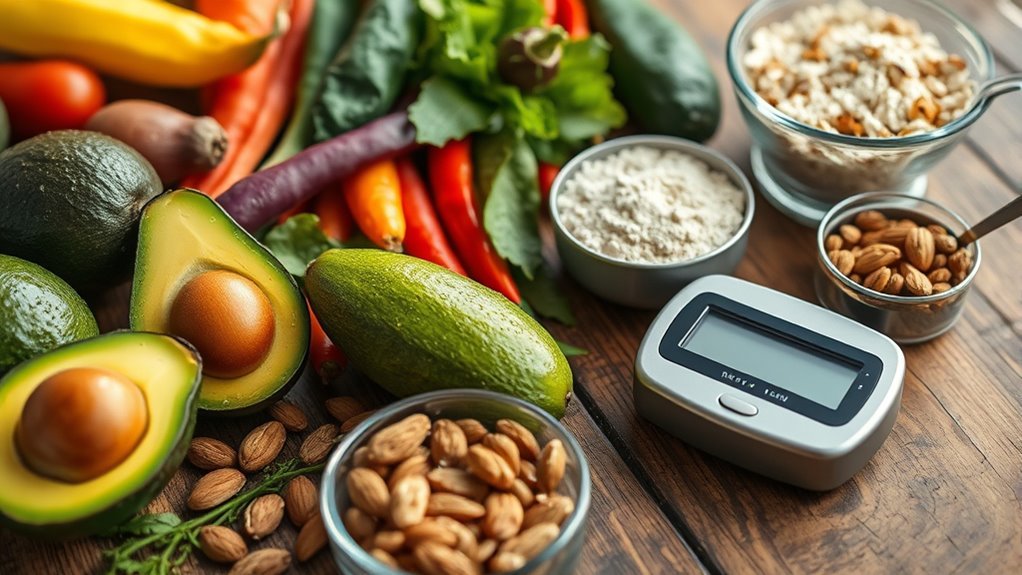To achieve ketosis on a keto diet, you should aim for 20 to 50 grams of net carbs per day, depending on your personal goals and metabolic response. To calculate net carbs, subtract dietary fiber and certain sugar alcohols from total carbohydrates. This helps you manage your blood sugar levels and encourages fat burning. Understanding how to track and adjust your net carb intake can enhance your success on the keto journey. There’s more to explore on this topic!
Understanding Net Carbs

When it comes to the ketogenic diet, understanding net carbs is essential for success. Net carbs are calculated by subtracting fiber and certain sugar alcohols from total carbohydrates in food. This matters because, in a keto lifestyle, you aim to keep your carb intake low to encourage your body to enter ketosis. By focusing on net carbs, you can enjoy a wider variety of foods while still maintaining your carb limit. For instance, avocados and leafy greens are low in net carbs and high in nutrients, making them perfect for your meals. Knowing how to track net carbs helps you make informed choices, empowering you to live freely and enjoy delicious foods without derailing your ketogenic journey.
The Importance of Net Carbs in Keto

Calculating net carbs plays a significant role in your ketogenic journey, as it directly influences your ability to achieve and maintain ketosis. By understanding net carbs, you can reveal the full potential of keto benefits, such as improved energy levels and weight loss. Here are four reasons why carb awareness is essential:
Calculating net carbs is crucial for achieving ketosis and maximizing the benefits of your ketogenic journey.
- Keto Adaptation: Helps your body shift from burning glucose to fat for fuel.
- Hunger Management: Reduces cravings by stabilizing blood sugar levels.
- Nutrient Density: Encourages the consumption of low-carb, nutrient-rich foods.
- Personalized Approach: Tailors your carb intake to your unique needs, enhancing your success.
Embracing net carbs empowers you to enjoy freedom in your food choices while staying aligned with your health goals.
How to Calculate Net Carbs

To calculate net carbs, you first need to understand the role of dietary fiber in your diet. Start by looking at the total carbohydrate content on food labels and then subtract the grams of fiber. This simple calculation gives you the net carbs, which is essential for staying within your keto goals.
Understanding Dietary Fiber
Understanding dietary fiber is essential for effectively calculating net carbs, especially for those following a ketogenic diet. Fiber types can be categorized mainly into soluble and insoluble, each playing a unique role in digestion. Here are key fiber sources to evaluate:
- Vegetables: Leafy greens like spinach and kale are low in net carbs but high in fiber.
- Nuts and Seeds: Almonds and chia seeds provide healthy fats along with fiber.
- Berries: Raspberries and blackberries are lower in sugar and packed with fiber.
- Legumes: While not always keto-friendly, beans can be a good fiber source in moderation.
Calculating Total Carbs
Knowing how to calculate total carbs is essential for anyone on a ketogenic diet, especially when factoring in dietary fiber. To effectively manage your carb intake, start by reading nutrition labels to identify total carbohydrates per serving. This figure includes all carbs, such as sugars, starches, and fiber. For carb counting, subtract the grams of dietary fiber from the total carbohydrates; this gives you the net carbs, which are more relevant for ketosis. Remember, not all carbs impact your blood sugar equally. By focusing on total carbohydrates and understanding their components, you can maintain the freedom to enjoy a variety of foods while staying on track with your keto goals. Keep it simple, and you’ll find success!
Fiber and Its Role in Net Carbs
When you’re tracking net carbs on a keto diet, understanding dietary fiber is vital. Fiber isn’t digested by your body like other carbohydrates, which means it can be subtracted from your total carb count. This makes it important to calculate your net carbs accurately, helping you stay within your dietary goals while still enjoying fiber-rich foods.
Understanding Dietary Fiber
Although many people focus on counting total carbohydrates while following a ketogenic diet, it’s essential to recognize the significant role dietary fiber plays in calculating net carbs. Understanding the different dietary fiber types can help you make informed choices. Here are some key benefits of fiber:
- Digestive Health: Soluble fiber aids in digestion, while insoluble fiber helps maintain regularity.
- Weight Management: High-fiber foods keep you fuller for longer, reducing overall calorie intake.
- Blood Sugar Control: Fiber can slow down glucose absorption, helping to stabilize blood sugar levels.
- Heart Health: A diet rich in fiber is linked to lower cholesterol levels and improved heart health.
Calculating Net Carbs
Calculating net carbs is a fundamental aspect of adhering to a ketogenic diet, especially when factoring in dietary fiber. To determine net carbs, you subtract fiber and certain sugar alcohols from the total carbohydrates in your food. This approach allows you to focus on what truly impacts your ketosis. Common net carb sources include leafy greens, nuts, and seeds, which provide essential nutrients without derailing your carb counting. Remember, not all fiber is created equal; aim for soluble fiber, which can help with digestion and satiety. By mastering net carb calculations, you empower yourself to make informed choices and enjoy a diverse range of foods while staying within your carb limits. Your journey to freedom in food choices starts here!
Sugar Alcohols: What You Need to Know
While sugar alcohols can be a tempting alternative for those following a keto diet, it is essential to understand how they impact your net carb intake. Here’s what you need to know:
Understanding the effects of sugar alcohols is crucial for managing net carb intake on a keto diet.
- Sugar Alcohols Benefits: They provide sweetness with fewer calories, helping you satisfy cravings without spiking blood sugar.
- Low Glycemic Impact: Many sugar alcohols have minimal effects on insulin levels, making them a keto-friendly option.
- Digestive Issues: Consuming too much can lead to bloating or diarrhea, a significant drawback to keep in mind.
- Net Carb Calculation: Not all sugar alcohols are created equal; subtract certain amounts from your total carbs to calculate net carbs accurately.
Being informed lets you enjoy the freedom that comes with choosing the right sweeteners on your keto journey.
Daily Net Carb Limits for Keto
When starting on a keto diet, it’s essential to stick to a daily net carb limit to achieve and maintain ketosis. Most people find that limiting their net carbs to around 20-50 grams per day helps them stay in this fat-burning state. Effective keto meal planning can make it easier to adhere to these limits, as it allows you to choose low-carb foods that fit your goals. If you’re considering carb cycling, you might adjust your carb intake on certain days, but consistency is key for most. Remember, everyone’s body responds differently, so monitor how you feel and adjust as necessary. Ultimately, finding the right balance will empower you to enjoy the freedom of a keto lifestyle.
Common Foods and Their Net Carb Counts
Understanding the net carb counts of common foods can greatly aid in your keto journey. Knowing what you can enjoy helps you maintain that freedom while sticking to your plan. Here are some common foods with their net carb counts:
- Keto Snacks: Pork rinds (0g net carbs)
- Low Carb Vegetables: Spinach (1g net carb per cup)
- Protein Sources: Chicken breast (0g net carbs)
- Dairy Options: Cheddar cheese (1g net carb per ounce)
When meal prepping or dining out, be mindful of portion sizes. Opt for nuts and seeds for healthy fats, and consider fruit alternatives like berries for keto desserts. Keeping track of these net carbs allows you to enjoy your meals while staying on track!
Tips for Tracking Net Carbs Effectively
Tracking net carbs effectively is essential for maintaining a successful keto lifestyle, especially since even small miscalculations can impact your progress. Start by using reliable tracking tools, like apps or food diaries, to log your meals consistently. This helps you stay accountable and aware of what you’re consuming. Pay close attention to portion sizes, as they can greatly alter your net carb count. Weighing or measuring your food can lead to more accurate tracking. Additionally, familiarize yourself with common foods and their net carb counts to make informed choices. Finally, review your entries regularly to identify patterns and adjust as needed. With diligence, you’ll enjoy the freedom of a keto lifestyle while staying on track.
Adjusting Your Net Carb Intake for Optimal Results
Adjusting your net carb intake is essential for maximizing the benefits of a keto diet, as individual responses to carbohydrates can vary markedly. To find your ideal level, consider these steps:
- Monitor Energy Levels: Pay attention to how your body feels; fatigue may signal too many carbs.
- Track Progress: Keep a journal of weight changes, mood swings, and cravings.
- Experiment Gradually: Adjust your carb intake in small increments to find what works for you.
- Stay Flexible: Life changes, so be ready to tweak your intake based on activity levels or health goals.
Frequently Asked Questions about Net Carbs for Keto
1. What are net carbs?
Net carbs refer to the total carbohydrates in a food item minus the fiber and certain sugar alcohols that do not significantly raise blood sugar levels. This concept is important for those following a ketogenic diet, as it helps in calculating the carbohydrate intake that affects ketosis.
2. How many net carbs should I consume on a keto diet?
Most ketogenic diets recommend consuming between 20 to 50 grams of net carbs per day to maintain ketosis. The exact amount can vary depending on individual factors such as activity level, metabolic rate, and personal health goals. It’s essential to monitor how your body responds to different carb levels.
3. How do I calculate net carbs in food?
To calculate net carbs, subtract the grams of fiber and the grams of certain sugar alcohols (like erythritol) from the total carbohydrates in a food item. The formula is: Net Carbs = Total Carbohydrates – Fiber – Sugar Alcohols. This will give you the carbohydrate content that affects blood sugar levels.
4. Can I eat fruits on a keto diet considering net carbs?
Yes, you can eat certain fruits on a keto diet, but it’s crucial to choose low-carb options and consume them in moderation. Berries, such as strawberries and raspberries, are generally lower in net carbs compared to other fruits. Always check the net carb content and factor it into your daily limit.
5. What are some common foods to avoid to limit net carbs?
To limit net carbs, avoid foods high in carbohydrates such as bread, pasta, rice, sugary snacks, and starchy vegetables like potatoes and corn. Instead, focus on low-carb foods like leafy greens, non-starchy vegetables, meats, fish, eggs, nuts, and healthy fats. Always check the nutrition labels and calculate net carbs to stay within your limits.
References
- https://www.ncbi.nlm.nih.gov/pmc/articles/PMC7071220/
- https://www.healthline.com/nutrition/what-are-net-carbs
- https://www.webmd.com/diet/what-are-net-carbs
- https://www.mayoclinic.org/healthy-lifestyle/nutrition-and-healthy-eating/expert-answers/keto-diet/faq-20473331
- https://www.nutrition.gov/topics/nutrition-education/what-are-net-carbs
- https://www.cdc.gov/healthyweight/healthy_eating/what_are_carbohydrates.html
- https://en.wikipedia.org/wiki/Ketogenic_diet


